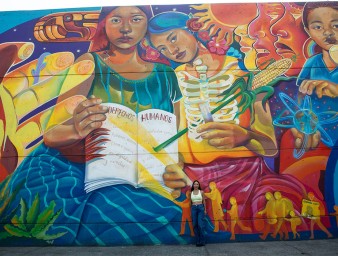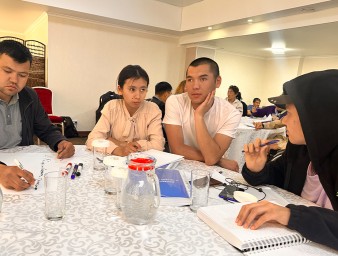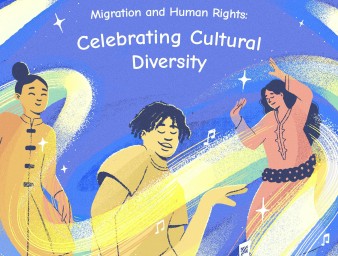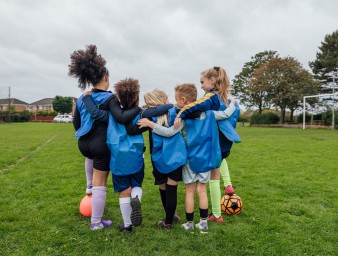Promoting inclusiveness in and through sports
26 July 2024

“When I was three years old, I eagerly awaited my father's return from work each day, excited for our customary car rides together. One day, as usual, my father came home and placed me in the car seat and as he was moving to the driver's seat, the car exploded due to a hidden explosive device,” said Najlah Imad Al-Dayyeni, a table tennis Paralympian from Iraq who will be participating in this year’s Paris 2024 Paralympic Games in Paris, France.
“At the time, I was unaware of what was happening,” she said. “It wasn't until later that I learned the explosion had severed my two legs and right hand, with the force throwing them onto the neighbour’s roofs. My parents were left in shock.”
When she regained consciousness weeks later, she asked her mother where her limbs had gone. Her mother said they had gone to heaven.
“It was then that I began to grasp the reality that a significant part of my body and spirit had been irrevocably lost,” she said.
Since that moment, Al-Dayyeni faced many challenges.
“Not only because of the disability itself, but also because of the discrimination I was exposed to every day,” she said. “At school, especially in sports lessons, I would feel pain when I saw girls running and playing freely and I was unable to do so.”
When Al-Dayyeni was just ten years old, she found a new passion in table tennis that would set her on a new, exciting path. With unwavering support from her family, coaches, and the Paralympic Committee and many hours of arduous work, she became a member of the national table tennis team for athletes with disabilities.
Today, she is the first table tennis champion with a disability in Iraq and Asia. She participated in the Tokyo Paralympics as youngest table tennis player. Al-Dayyeni advocates for the rights of persons with disabilities in sport and beyond, especially for children and young girls in armed conflict.
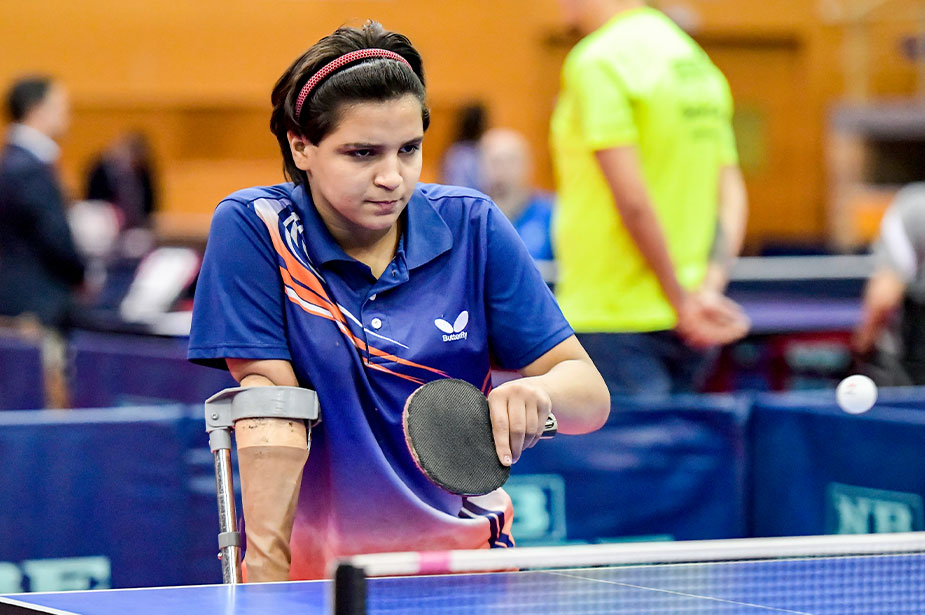
Najlah Imad Lafta Al Dayyeni, from Iraq, participated in numerous local, regional and international tournaments, consistently achieving top rankings, including a gold medal in table tennis in the Hangzhou 2022 Asian Para Games. © ITTF
“
Persons with disabilities in sport challenge societal stereotypes and promote diversity.
“
Najlah Imad Al-Dayyeni, Table Tennis Paralympian
A Refugee Olympic Team will also compete in the Paris 2024 Olympic Games with a record number of thirty-six refugee athletes, which is a powerful symbol of inclusion and belonging that athletes and displaced people around the world have found through sport.
Yiech Pur Biel, a South Sudanese refugee athlete, was forced to flee the war in 2005. He arrived in Kakuma refugee camp in northern Kenya where his athletic ability was recognized during trials to identify refugee athletes. In 2016, Biel made history by competing for the first Refugee Olympic Team in the 800m event at the Rio Summer Olympics in Brazil.
“As an athlete, I had the privilege to represent displaced people on the global stage of the Olympics… as a young person, I experienced firsthand the power of sport to bring people together,” he said.
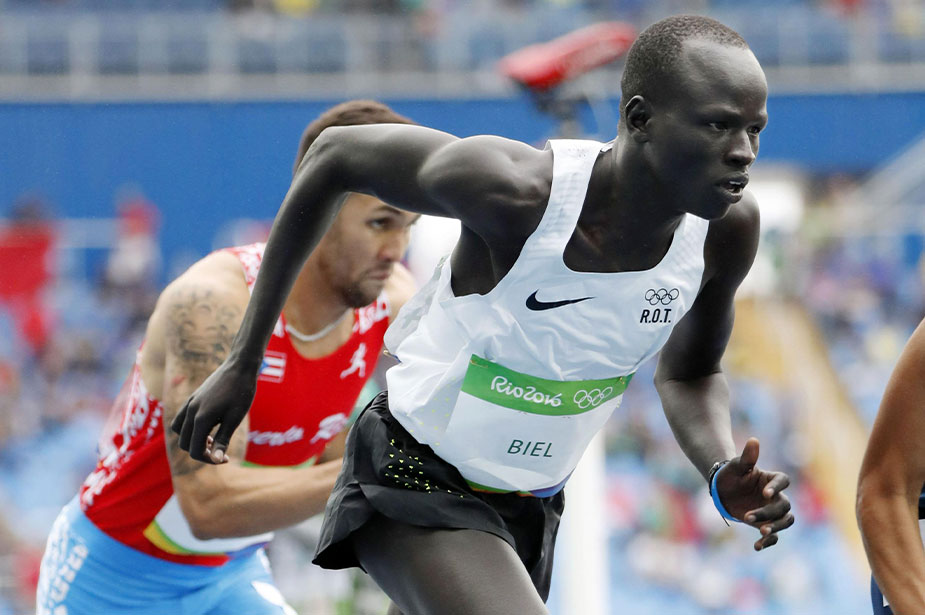
Yiech Pur Biel from South Sudan of the Refugee Olympic Team runs in a men's 800-meter heat during the athletics competitions of the Summer Olympics at the Olympic stadium in Rio de Janeiro on Aug. 12, 2016. © Reuters
Since competing at the Rio games, Biel became a Goodwill Ambassador for UNHCR, the UN Refugee Agency, and serves as a member of the International Olympic Committee.
Both Al-Dayyeni and Biel shared their personal stories during a panel event on sport and the Olympic ideal during the 56th session of the Human Rights Council in Geneva, Switzerland.
Athletes must be protected
Every few years, the Olympic and Paralympic Games capture the imagination of many around the world. By connecting people from all corners of the world, they can challenge stereotypes and celebrate the remarkable human spirit.
“The world of sports is not immune from human rights challenges, including when mega events are organized,” said UN Human Rights Chief Volker Türk during his opening statement at the interactive dialogue in Geneva.
“When athletes use their voice to promote equality in sport, they are in fact human rights defenders,” he said. “These athletes must be supported and protected, in the same way that we support all human rights defenders, and by ensuring that they have avenues to speak out and seek redress, safely and without fear of reprisals.”
The practice of sport without discrimination of any kind is conceived as a human right under article 27 of the Universal Declaration of Human Rights. Sports should be a space where every individual, regardless of their background, can participate and thrive, Türk added.
Non-discrimination is also enshrined in the Olympic Charter and the International Olympic Committee (IOC) has recognized that sporting bodies have human rights responsibilities.
Promoting human rights through sport and the Olympic ideal has been acknowledged by the Human Rights Council, including through Human Rights Council resolution 54/25 for a world of sports free from racism, racial discrimination, xenophobia and related intolerance on which UN Human Rights collaborates on its implementation.
But there is still a long way to go to ensure full respect for human rights, non-discrimination and inclusiveness in sport. Many people continue to face challenges in exercising their right to participate in sports, including athletes living in poverty, athletes who speak out, athletes with disabilities, refugees, the LGBTIQ+ community, women and indigenous peoples.
The Office engages with various sports associations and actors, and recently partnered with the civil society organisation World Players Association to help them empower athletes to use the human rights mechanisms to promote their rights. World Players Association is the leading voice of organized players in the governance of world sport, which engages 85,000 players across professional sport through more than 100 player associations in over 60 countries.
Some businesses in the sports world are aligning their practices with the UN Guiding Principles on Business and Human Rights and UN Human Rights has encouraged various sport actors to align their practices with it.
“Together, we can help amplify the promise of human rights and sports to unite our human family and to promote a culture of peace,” Türk said.
